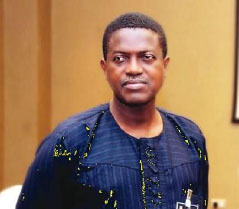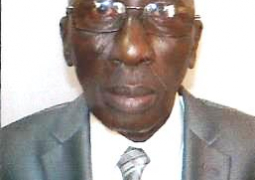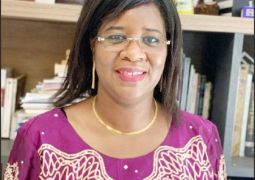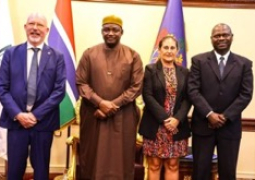
Dr Barry: Hello, good evening, Dr Wale. I would like to begin this interview by first asking you to kindly introduce yourself. Who are you? And what has been your target area as a writer?
Dr Wale: Thank you and I’m happy to be here. My name is Dr Wale Okediran. I’m a medical doctor by training and a writer by calling. I’ve been writing since I was a student in the university in the seventies and as of today, I’ve published about fourteen novels some of which have been used as textbooks by universities in Nigeria. I’ve also held the position of the president of the association of Nigerian authors. This was way back in 2010. I’ve also had a stint in politics as a member of the Nigerian parliament for four years. Recently, one of my books, Tenants of the House was adapted into a movie that has found its way to the Netflix platform, and it did very well. I’ve assumed the position of Secretary General of the Pan African Writers’ Association, August 2020 which means that I’ve been in office for over a year. My office is in Accra, Ghana.
Dr Barry: You’ve mentioned PAWA which is the Pan African Writers’ Association. Can you tell us a little bit about PAWA’s history? How did it come about? And why do you think Ghana was the right place for it?
Dr Wale: Way back in 1989, The African Union, at that time it was called the Organization of African Unity (OAU) decided that it would be nice to have a platform to propagate African literature because they believed that literature can be used to foster African unity. It was during the time of the presidency of the former Ghanian president Jerry Rawlings. He agreed that Ghana will host that agency which was then named the Pan African Writers’ Association and since that time, Ghana has been hosting it. It has its secretariat donated by the Ghanaian government and which has also been supporting some other logistics; for example, some of the staff salaries are paid by the government and some of the facilities are also catered for by the Ghanaian government. So that’s PAWA. It’s an umbrella body for all the Writers’ Associations in Africa. By expectation, every African country should have a Writers’ Association. We have fifty-four countries in Africa so ideally, we should have fifty-four member associations under PAWA. However, it’s only about forty or so countries that have active Writers’ Associations. That is the work of PAWA and what we do. We encourage and empower African writers by organizing seminars and workshops. We also endow literary prizes which can be competed for by writers. We also try as much as possible to see how we can exchange books across the African continent. We try to do a lot of translations from one target language to another. In the last few years since I took over office, we’ve been trying to resuscitate some writers’ associations that have not been very active. We’ve been doing this by giving them visitations, so on and so forth. We’ve also been conducting online workshop training for children’s literature as well as poetry. Right now, we’re in the process of judging the African Prize for Poetry in five different languages. The submissions have been made. The judges are already working and we’re looking forward to the time the results will be announced. We’re also looking forward to organizing a general assembly of the Pan African Writers’ Association because for the last twenty years or so, the general assembly has not taken place. We’re working assiduously to see that it would hold before the end of this year. We hope that during that event, all the writers’ associations will be represented, and we can organize some seminars and see how we can move PAWA forward, and if necessary, have elections. In a nutshell, this is what we’ve been doing in PAWA.
Dr Barry: We have noticed in the last few months, you’ve mentioned that PAWA has started emerging, reaching out, creating platforms, and showcasing African writers. What are your future projects? What would say is the thing holding PAWA back from being what it is expected to be?
Dr Wale: Okay, that is a very important question. One thing that is doing so is Funding. We know that the work of literature, virtually, on such a big continent like Africa cannot be done without funds. And in its wisdom, the African Union, many years ago mandated each African country to support PAWA with a donation. Unfortunately, not many countries have been doing this. Thus, we are praying and hoping, and working towards encouraging each African country to pledge in this annual donation to PAWA. Once this is done, we would be able to do many things. Then the next thing would be to identify iconic African leaders either in politics, literature, finance, or leadership and put together their names in some collections of poetry, social studies, or biographies. We started this exercise with the former president of Ghana, HE JJ Rawlings when we asked our writers all over the continent of Africa to send him some poems and articles to honour him, and we had a very successful turnout. Fifty-two writers from twelve African countries contributed to the book which was released a few weeks ago. We call it JJ Rawlings Memories and Mementos, and that book has been published now, so we hope that we would soon identify another great African leader whom we can also immortalize through a book. Then, the other thing which is also important is the issue of translation because we believe that as African writers, we should enjoy, or be educated by books written in different languages. The five official languages recognized by PAWA are English, French, Kiswahili, Portuguese, and Arabic. And we believe that any writer who writes in any of these languages, need to translate it into other languages for the benefit of other writers, and this again is capital intensive. We are also looking forward to printing that as soon as we have enough funds so that we can get this phase on. And then, finally, we believe that as an African writers’ association, we should encourage the use of indigenous African languages. We know that we have so many languages in Africa, at the same time, we don’t want them to die. And that’s why we believe that at the country level of all our member associations, we want to encourage them. For example, in Nigeria, we want to encourage member associations there to promote indigenous language, and in the Gambia here, we should like to see our writers write in the popular indigenous languages in The Gambia, even other African countries. Once we can do all this, then we’ll know that yes, PAWA is really, back on track. That is our plan.
Dr Barry: Thank you, I have seen that most of what you have said is also added to the challenges, so what would be your final word? What do you think you would expect from the rest of the writers’ associations, most particularly also what do you expect from The Gambia?
Dr Wale: Yes, we are so happy with what we have seen in The Gambia. I have seen a very virile writers’ community, very passionate young writers, and more importantly, the beautiful leadership in The Gambia are very supportive of literature. We had an audience with the Minister of Tourism and Culture, and he made it clear that he will work with the government of Gambia in their support of Gambian literature, and this is something that made us very happy because it’s not in every country that you will find such government that is this supportive of literature, and because of that, we have proposed for the government of The Gambia to host our general assembly which we are hoping to organize in May this year. That, I believe will be a win-win situation for both Gambia and PAWA. For us, PAWA will make history for being able to host a general assembly in more than two decades and will want to properly push its ground to have proper documentation of PAWA – our past, our present, and our future. For The Gambia, it would also be a wonderful opportunity to showcase the emerging writing community that is coming out of this very young country. People have been putting so much emphasis on some other countries because of their size or their past achievements like Nigeria, Ghana, Kenya, and other countries. Whereas here in The Gambia, we also have a very passionate writing community, so hosting the general assembly would put The Gambia in the limelight of the international scene. And for this, we are looking forward to very good cooperation from the Gambia, and for us, we believe that from that general assembly, we can start a lot of projects where The Gambia would play a very important role because of what you said. Part of the resolutions at that general assembly would give The Gambia a very important role in promoting literature.
Dr Barry: Thank you very much, Dr Wale.




